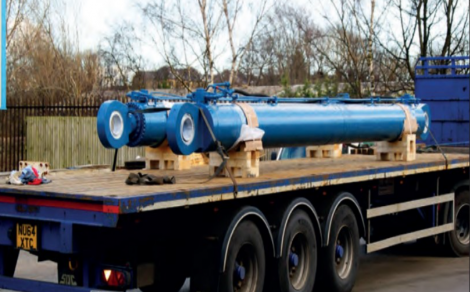- Home » Editorial » Hydraulics
Four ways to increase hydraulic cylinder lifespan

By James Oldroyd, director, Apex Hydraulics
All operatives working with hydraulic cylinders will be aware of the large-scale costs and downtime associated with a failed cylinder in a piece of machinery.
When a hydraulic cylinder breaks mid operation, the consequences are costly – both in terms of repairs and in the downtime required to dismantle and resolve any damage. Increasing the lifespan of a hydraulic cylinder in any piece of equipment is a priority; from vehicles; to factory machinery; to offshore rigs. Apex Hydraulics offers advice on the top suggestions for increasing the lifespan of hydraulic cylinders:
Optimum rod coating
If you are developing a bespoke hydraulic cylinder for a fabrication, then getting the best coating for the cylinder rod is vital. Once a rod coating become chipped, cracked, or corroded, contaminants quickly enter the hydraulic fluid, causing failure. Having a rod coating that is resistant to the immediate environment can vastly reduce this deterioration, increasing the longevity of the cylinder drastically. The best type of coating for a cylinder rod will depend on the application that it will be used for and the environment that it will be placed in. An offshore hydraulic cylinder will likely be exposed to a more corrosive environment than a piece of machinery in an injection moulding factory for example. Your hydraulic cylinder designer and manufacturer will advise you on the best coating for your product.
Most rods are coated with hard chrome plating. Some applications in particularly harsh environments will require a more specialised coating. Corex,a specially developed coating, has an exceptionally low porosity; less than 1% (compared to Hard Chrome Plating’s 5%- 10%. Its hardness, at 1400 Hv makes it extremely resistant to any damage. Apex can also offer many other coatings such as laser cladding, HVOF and ceramic coatings where required.
Regular offsite maintenance
Regularly maintaining your hydraulic cylinder is important, particularly for applications where a failure would be disastrous. Offshore applications tend to plan routine maintenance at the end of every project – sending the hydraulic cylinders for a full strip and assessment.
At this point, a full analysis is carried out assessing all components. Seals are always changed, valves and bearings checked, and the cylinder is repainted – making the cylinder “good as new” once again, guaranteeing its effectiveness for the next cycle of work. Hydraulic cylinder repairers can offer recertification paperwork as required. This type of regular maintenance is usually far less expensive than purchasing new cylinders and gives peace of mind when using the cylinders in distant locations where failure is not an option.
Regular onsite maintenance
Frequent inspection of external wear components such as pins, bearings and nearby fabrication can prevent damage to the actual cylinder by reducing side load and mis-alignment. Failure caused by side load and mis-alignment can seriously damage the bore and rod which can render the cylinder beyond economical repair. Defective external valves and pipework can also eventually cause damage to the cylinder. Failing valves could cause over pressurisation or reduce oil flow causing rapid failure.
Good oil maintenance
Dirty and contaminated hydraulic fluid is one of the main causes of hydraulic cylinder failure as it can reduce effectiveness of valves and damages rod coatings and bores. Keeping oil clean is crucial to keep cylinders working well.
Specialised bypass filtration units are an excellent way of ensuring that oil stays clean – and can even clean up dirty oil. In many cases oil can go from NAS 10 or 11 to NAS 4 or 5 within a matter of months; with initial six-week filter changes, that can become less frequent as the oil becomes cleaner.
Bypass filtration units can be retrofitted to most hydraulic systems because they can be isolated from the hydraulic cylinder and the filter changes require little-to-no downtime. This is one of the easiest and most cost-effective ways of increasing the life of a hydraulic cylinder; particularly for machinery in factory lines such as injection moulding machinery. Bypass filtration units are something that Apex Hydraulics have many years of experience in and can even offer a free onsite trial if required.
https://twitter.com/apexhydraulics
https://www.facebook.com/apexhydraulics
https://www.linkedin.com/company/apex-hydraulics-limited/
-
PPMA 2025
23 September, 2025, 9:30 - 25 September, 2025, 16:00
NEC, Birmingham UK -
Advanced Engineering Show 2025
29 October, 2025, 9:00 - 30 October, 2025, 16:00
NEC, Birmingham UK










